

The Shenzhen Cantonese Opera Troupe was formed in 1974. From a small group of 50, it has, following the establishment of Shenzhen as a special economic zone, grown into a highly professional troupe. The troupe has been performing regularly in both Guangdong and Guangxi provinces and overseas.
During the past decades, efforts to upgrade the troupe and its members’ standards were made. Now it is a well equipped performing group with some of the country’s best scriptwriters, directors, artistes, musicians and stage technicians.
Among the better known artistes, each with many years of stage experience, include male lead players Wong Wai Kuan, Fung Gong Ai, Lay Wai Cheong, leading female players Su Chun Mui and Lai Yuen Hong.
As most members in the troupe are young, they are enthusiastic and dare to be different. They have been winning praises every where they go and are still striving for excellence.
The Shenzhen Cantonese Opera Troupe led by Wong Wai Kuan, Fung Gong Ai and Soh Chun Mui performed at the Kreta Ayer People's Theatre from 23.11.2002 to 7.12. 2002. Yew Ji Keong and Nam Fung were the guests artistes.
Below are photos of some of the operas performed. (Please click on picture to view enlarged version)
 |
 |
| Li Yu Of Southern Tang Dynasty 23.11.2002 | Li Yu Of Southern Tang Dynasty 23.11.2002 |
 |
 |
| Lu Bu And Diao Chan 26.11.2002
|
Lu Bu And Diao Chan 26.11.2002
|
 |
 |
| Havoc In The Palace 28.11.2001 | Havoc In The Palace 28.11.2002 |
 |
 |
| The Lovers' Swords 30.11.2002 | The Lovers' Swords 30.11.2002 |
 |
 |
| Despondent Dream Of 40 Years 2.12.2002 | Despondent Dream Of 40 Years 2.12.2002 |
 |
 |
| The Duel 5.12.2002 | The Duel 5.12.2002 |
 |
 |
| The Goddess Of Luo 7.12.2002 | The Goddess of Luo 7.12.220 |
Li Yu of Southern Tang dynasty
Li Yu, the emperor of southern Tang Dynasty, was gifted in poetry. However, he was not a capable ruler; neither did he hanker for power. All he cared for was the beautiful scenery of mountains, rivers, women; and poetry. Consequently, he was overthrown by Zhao Kuang Yin, who became the very first emperor of Song Dynasty.
After surrending to the Song Dynasty, Li resigned himself to spend the rest of his life writing florid poetry but that did not alter his tragic destiny. His beloved concubine, Xiao Zhou Hou, was possessed by Zhao’s brother, Guang Yi, who succeeded the throne. Li Yu’s brother was also killed and his most treasured poetry manuscript burnt and reduced to ashes by the cruel Guang Yi.
Lu Bu And Diao Chan
Towards the end of Han Dynasty saw the decline of the imperial family and the country in turbulance. Dong Zhuo, a treacherous minister, was in cahoots with his brave godson Lu Bu. They held the emperor under duress to control the feudal lords.
Minister Wang Yun and the court officials loyal to him were unhappy with Dong Zhuo. However, they dared not make any attempt to get rid of Dong Zhuo because Of Lu Bu.
Diao Chan, a beautiful songtress, was willing to sacrifice herself for the country. To drive a wedge between Dong Zhuo and Lu Bu, she first betrothed herself to Lu Bu, and then became Dong Zhuo’s concubine. The plot worked. Diao Chan instigated Lu Bu to join Wang Yun, and Dong Zhuo was killed in the end.
Havoc In The Palace
General Chu Batian returns in victory and is personally received by the Emperor.
During a trip out of the palace to take in the sights, the Princess is waylaid by bandits. She is rescued by Zhang Jiangqiu and they fall in love. One night, Jiangjiu sneaks into the palace to see the princess. Batian orders a search of the palace and apprehends Jiangjiu. To force the Princess’ hand in marriage, he plots to get rid of Jianqiu who rivals him for the Princess’ love. Jianqiu escapes with the help of his friend, Jia Fu.
As his army is under Batian’s control, the Emperor is powerless and is compelled to betroth the Princess to Batian. Just as she is at her wits’ end, Jianqiu, in female disguise, comes to the Princess’ aid.
In the bridal room, Jia Fu impersonates the Princess and takes her place in the wedding. Meanwhile, together with his comrades, Jiannqiu charges into the palace and overpowers Batian. It is a happy reunion for the Princess and Jiannqiu.
The Lovers" Swords
During the Northern Song Dynasty, the Shuo province enjoyed years of peace under the protection of generals Cao Ke Rang and Heng Jie. However, Premier Shen, who plotted to overthrow the emperor, saw both Cao and Heng as thorns in his flesh. He schemed to get rid of them. Heng Jie was removed from office. He returned to his homeland with his son (Heng Bao), daughter-in-law (Yi Qing Yun) and daughter (Heng Xiu Jing). Ten years later, the Song Emperor also ordered General Cao’s family to be excuted on the instigation of Premier Shen. All of the Cao family was killed; only Cao’s son, Cao Bao, escaped death.
Cao Bao and Heng Xiu Jing were childhood sweethearts. They were betrothed and the Heng’s were given one of the Yuanyang swords (Cao’s family heirloom) as a token of their betrothal. Cao bao, who had possession of the other sword, sought refuge at the Heng’s residence.
Seized by greed Heng Bao succumbed to Premier Shen’s inducement. His father Heng Jie, died of anger when he learnt of it. After his death, Heng Bao arrested Cao Bao in order to gain Premier Shen’s favour. However, his wife, Qing Yun, and nanny joined forces with Cao Bao and Xiu Jing and killed Heng Bao with the Yuanyang swords. Cao Bao and Xiu Jing were married in the end.
The Duel
Late in the Song Dynasty, corruption is a common practice within the government party. The country is under severe attack by the foreign country, Jing. The treacherous court official, Qing Kuei, deceives the emperor into sending Qing Gou, the great grandson of Qing Kuei, to have a peace settlement with Jing. Gou refuses to be traitor to his own country.
Mong Chu from Ging Mo, a great grand-daughter of Ye Fei, tries to sneak into the palace to assassinate Gou after learning that Gou has been sent to go and befriend Jing. The plan of assassination fails, and Mong is sought after by the soldiers. On the way of escape, Mong finds Gou paying respect to the deceased Ye Fei at his tomb. Mistaking him as Ye’s ancestor, Mong and Gou adopts each other as brother and sister. Later they are married to each other. Later, Gou feels ashamed of his own family background, and this prompts him to leave a letter of his true identity with Mong and leaves.
Qing Kuei again attempts to destroy the plan against Jing. He appoints Su Mui to be the general in Xiang Yang. Coincidently, Gou is there seeking for a position as a soldier in Xiang Yang. Su picks on Gou and severely punishes him, and throws him to a palace near a river. Fortunately, Gou is saved by his teacher, Lee Cheng Zee. Lee then appoints Gou as a general of a volunteer force.
In a battle against Jing, Mong and Gou meet again. They fuss over their past and fight mightily together the enemy. Eventually they are both killed in the battle.
The Goddess Of Luo
Towards the end of Han Dynasty, the three kingdoms_Wei, Shu Han and Wu were in conflict with one another. Cao Zhi, the third son of Cao Cao, was in love with Zhen Nu Yu Chan. She pledged her love to him with the gift of a pillow made of gold and jade. Cao Pi, Cao Cao’s eldest son, was suspicious and jealous of his brother, Cao Zhi. He tried to persecute him whenever he could, and wrest Yu Chan from Cao Zhi. Depressed that she was the source of conflict between the two brothers, Yu Chan decided to end her life by jumping into the Luo River. Years later when he passed by the Luo River, Cao Zhi’s thoughts were of Yu Chan whom he dreamt was there by his side.
Magazine of Wong Wai Kuan's Concert in Hong Kong
About Wong Wai Kuan His
Photos Old Photos Home
The Hero's Sword The
Romantic Emperor Butterfly Lovers
Gratitude and Vengeance Mui
Gui Ying The Goddess Of Luo VCDS
Links Opera
Synopses His Visits To
Singapore Female Role
Cantonese
Opera Troupes